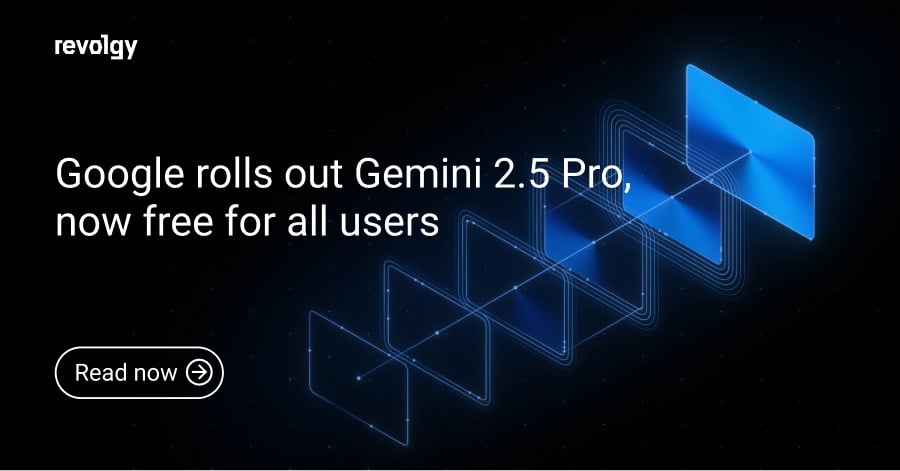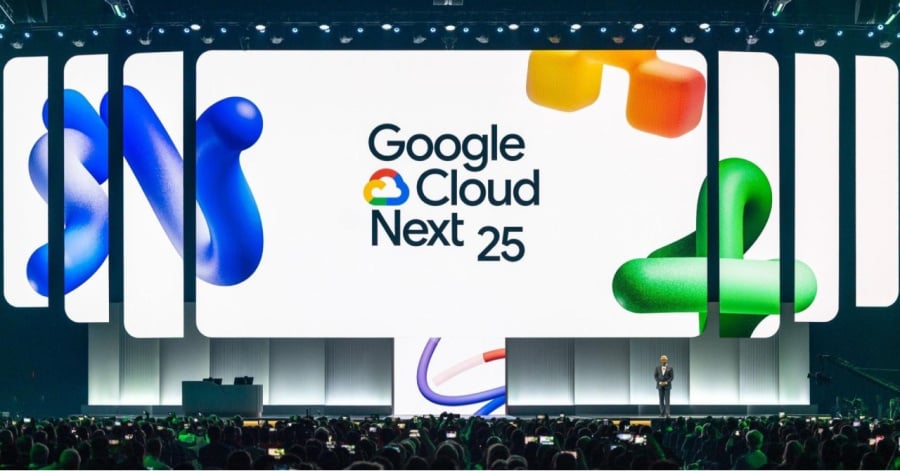GCP, Google Workspace, AI
Google I/O 2025 highlights: AI Mode, Gemini 2.5, Veo 3 & latest AI updates
Google’s I/O 2025 conference made one thing clear: AI is no longer just a feature — it’s the foundation of Google’s entire product line. The event was packed with announcements showing how AI is being tightly integrated into everything from search and productivity tools to image and video generation. Whether it’s helping users find better answers or giving developers smarter tools, Google is betting big on AI to change how we use tech every day.
Here’s a breakdown of the biggest announcements — from smarter Search and more capable AI models to experimental projects aiming to automate real-world tasks.
AI Mode gives a new direction for Google Search
Google is rolling out one of its most significant updates to Search in years: a new AI Mode built on its advanced Gemini 2.5 model. It’s designed to understand and answer complex questions in a way that feels more natural, contextual, and useful — moving beyond just a list of 10 blue links to something closer to a real conversation.
The AI Mode lets users ask complicated, multi-part questions and get synthesized, context-aware answers. After initial testing, it’s now rolling out to users in the US through the Google app.
AI Overviews replace basic link lists
One major feature is AI Overviews, to help handle harder questions that typical search results can’t easily answer. Instead of just listing websites, Google now shows AI-generated summaries that pull information from multiple sources. It’s built to give users a full answer right on the results page, making it easier to get useful insights without having to dig through multiple websites.
All powered by Gemini 2.5
These improvements, including AI Overviews and Deep Search functionalities, are powered by Gemini 2.5, Google’s newest AI model. It’s more context-aware and can understand questions more deeply than past versions — scoring the highest scores in the LMArena.

Multimodal, conversational search
Search is also becoming more visual and interactive. It now supports multimodal search, which means users can ask questions in new ways, like pointing their phone’s camera at something and asking about it. Tools like Gemini Live, now free to use, let people get instant answers by showing the AI what they’re seeing or even sharing their screen.
Deep Search for expert-level answers
For users needing to dive deeper into a topic, AI Mode introduces “Deep Search” capabilities. It uses Gemini 2.5 to quickly generate detailed reports on complex topics, bringing near-expert insight directly into the search experience.
Agent Mode for better task automation
Coming soon to desktop users is the experimental capability Agent Mode, which aims to go beyond just answering questions. It’s expected to help users carry out tasks based on their queries — combining features like live web browsing, in-depth research, and smart integrations with Google apps.
AI Overviews impacts search behavior and click-through rates
With 1.5 billion people already using AI Overviews, early data shows a big shift in behavior. Reports suggest traditional click-through rates have dropped nearly 30%, as more users are getting the answers they need directly from the summaries. For content creators and SEO teams, this means rethinking strategies in a world where AI answers are often the endpoint.
Gemini 2.5 Pro and new AI models
At I/O 2025, Google showed how quickly its AI tools are improving, especially the Gemini models. This section covers what’s new with Gemini 2.5 Pro, including a new feature called “Deep Think” that helps it solve harder problems. We’ll also look at how Gemini is being used more in Google Workspace, the release of new AI models for specific tasks, and big updates in tools for creating videos and images. Google also introduced new subscription plans so more people can use these advanced tools.
Gemini 2.5 Pro: Advanced reasoning with Deep Think
Google’s most advanced AI model, Gemini 2.5 Pro, now includes “Deep Think”, enabling the model to consider multiple hypotheses before responding, for stronger reasoning skills and more complex questions and tasks. The feature is still being tested before wider release, as Google checks it for safety and reliability.

Native audio output and Live API upgrades
Google has introduced native audio output and a preview of audio-visual input via the Live API, enabling more natural, expressive voice interactions with Gemini. Developers can now control tone, accent, and speaking style — for example, asking for a dramatic voice during storytelling. The model can also use tools like searching the web.
Text-to-speech previews now support two voices per interaction and handle 24+ languages, with expressive outputs like whispers.
More usefulness in Google Workspace
Gemini is also getting deeply integrated into Google Workspace. Expect personalized smart replies and inbox filtering in Gmail, or real-time speech translation in Meet. These additions are designed to make daily tools smarter and faster without changing the way you work.
Advanced coding and developer capabilities
Developers get better coding support, too. Gemini 2.5 Pro now offers stronger assistance with programming tasks, helping with everything from debugging to building applications.
New models like Gemini 2.5 Flash and Gemini Live
Google is expanding its Gemini AI family with models built for different tasks and use cases, giving users even more options.
Low-cost Gemini 2.5 Flash for speed and efficiency
Gemini 2.5 Flash is optimized for tasks that need fast, lightweight responses, with cost efficiency in mind. It’s set to become the default model in June, offering quick and accurate turnarounds.
Gemini Live: Mobile-first interactive AI
Gemini Live, now available for free on devices including iPhones, brings real-time AI help to one’s phone. Users can point their phone’s camera at objects to get instant answers or share their screen for AI-powered assistance, even integrating with tools like Google Maps and Calendar.
Next-gen Generative AI for video and images
Google’s creative AI tools are also getting big upgrades, aimed at both professionals and casual creators.
Veo 3: Dynamic videos with synced audio
Veo 3 can generate high-quality audio — including sound effects, ambient noise, and dialogue — directly within your videos. It offers top-tier performance in realism, physics accuracy, and following prompts closely, and it’s aimed at both storytellers and content creators.
Imagen 4: Photorealistic image generation with better typography
Imagen 4 is Google’s best image generation model yet, turning text into realistic images. It can handle fine details like textures and lighting, supports multiple styles (realistic or abstract), and works in different aspect ratios and high resolutions. It also does a better job of rendering text in images and adds safety features like invisible watermarks to mark AI content.
AI Pro and Ultra subscriptions
To access tools like Veo 3 and Imagen 4, Google launched two new subscription plans:
- Google AI Pro ($19.99–$20/month) includes access to AI filmmaking tools and more.
- Google AI Ultra ($249.99–$250/month) is a premium plan with higher usage limits and expanded feature sets.
Projects Astra and Mariner: The next generation of AI assistants
At I/O 2025, Google also shared a look at future AI projects that go beyond today’s tools. Two big ones stood out: Project Astra, a smart assistant designed to understand the world around you, and Project Mariner, which builds AI agents to handle tasks online for you. Both aim to make AI more helpful, natural, and deeply connected to how we live and work.
Project Astra is the one assistant for everything
Project Astra is built to understand the world more like a person would — seeing, hearing, and remembering what’s going on around us. It can take in live video, audio, and text to help with things like identifying what a person is looking at or remembering where they left their keys.
Users can talk to it casually, and it can even answer before they finish asking. It works with tools like Google Search, Gmail, and Maps to help get stuff done without needing to switch apps. Right now, it’s being tested on Android phones and even smart glasses — point and ask, and Astra responds in real time.
Project Mariner automates the web with AI
Project Mariner is a new AI agent from Google DeepMind designed to automate tasks across the web. It acts like a smart helper within the Chrome browser, and can handle multiple actions, like online research, form-filling, booking, and navigation, based on written instructions.
Mariner can “see” what’s on the browser screen — text, images, code, buttons — and follow a list of up to ten instructions in order. As it works, it shows progress updates so a person can watch, pause, or tweak its actions in real time.
Currently in early testing, Mariner is available to US-based Google AI Ultra subscribers and is being integrated into the Gemini API and Vertex AI.
Developer and creative tools with AI boost
Google also rolled out a number of new tools designed specifically for developers and creators — making it easier to design, build, and produce content with AI in the loop.
New AI-powered tools
Several new AI tools are coming to assist at every stage of app development.
- Stitch helps with designing apps more efficiently by automating interface tasks.
- Jules is a coding assistant that works in the background and connects directly to existing repositories. It helps with tasks like writing tests, building new features, and fixing bugs.
Creative tools for filmmakers, artists, and musicians
Google showed off creative tools designed to work with artists, not replace them.
- Flow helps creators turn ideas into videos using simple text prompts. It combines advanced AI models for video, image, and language to make filmmaking easier and more accessible.
- Lyria 2 and Lyria RealTime let musicians experiment with sound in new ways.
- Plus, Google announced a partnership with Darren Aronofsky’s Primordial Soup on an AI-driven film project.
Authenticity with SynthID watermarking
SynthID is a tool from Google DeepMind that adds hidden watermarks to AI-made images, audio, text, and video to help spot them easily. It works across different media and has a site where anyone can check if content is real or AI-created.
AI in everyday tools
Beyond specialized creative software, Google is also infusing AI into broader productivity applications.
NotebookLM is an AI assistant that helps users organize and understand their notes and documents. It can summarize information, generate text, and provide contextual suggestions based on user inputs. It also offers “Audio Overviews”, which provide podcast-style summaries for on-the-go learning.
Download the free ebook: Make your information work for you with NotebookLM
Google Vids is an AI-powered video creation tool that helps users create professional-looking videos quickly and easily. It offers features like script generation, voiceovers, and the ability to generate custom video clips using Veo 2.
Google I/O 2025 was all about making AI more useful and accessible. From smarter search with AI Mode to creative tools like Veo 3 and Imagen 4, Google is weaving AI into everyday experiences. With projects like Gemini 2.5 and Astra, it’s clear they’re building toward a future where AI feels more natural, helpful, and part of how we live and work.
Read next: The executive’s guide to generative AI



